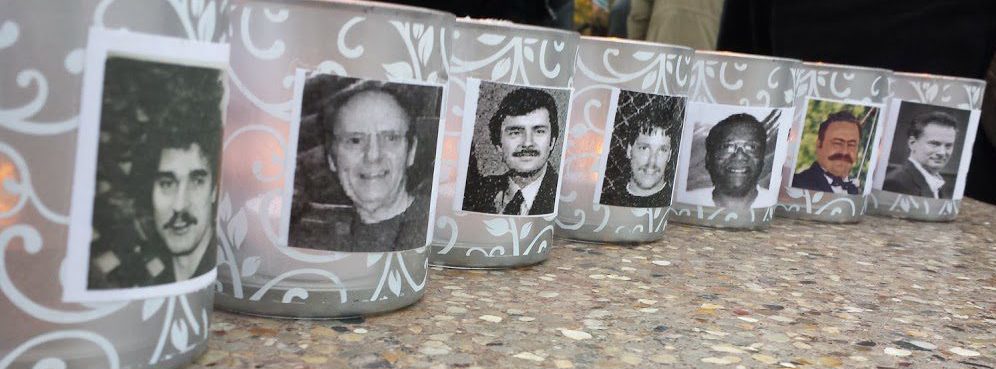
Met Keith for the first time during a visit on 4-12-2016
A recent posting of an article regarding an upcoming parole hearing for Keith Kutska—the last of the six men convicted in the Tom Monfils case—appeared on the Green Bay Crime Reports Facebook page.
The article’s headline: Parole hearing set for man convicted in 1992 Tom Monfils murder
I like to monitor these comments to get a sense of the current atmosphere regarding this case, so I was pleased when a friend, Tricia, alerted me to the Facebook posting.

Front page article on October 29, 1995:
The following comments are taken verbatim. All are entrenched in the past. Note that some contain strong language:
“How in the world do you parole a murderer with a clean conscience? Life should mean life, it shouldn’t mean until I change my mind.”
“Best place for this evil monster is PRISON, or whatever happen to Tom, same for this evil monster.”
“Green Bay if you let this guy go your putting a murder on the streets. Let’s see how long it is before he kills again. Y’all are stupid asf for letting him have parole.”
“Only way he should be leaving prison is in a body bag. No parole for any reason.”
“SCUM BAG”
The comments become increasingly vicious:
“Let him rot!!! They killed that poor man over bs… fuck all them!!!!”
“So did Tom get a refund when he was killed I don’t think so that fucker should rot in prison.”
“This f*cker deserves to rot. And the whole lot of em. All guilty.”
As an author, I always expect this response:
“Books don’t matter. That is someone trying to make some money. All that MATTERS is the jury’s outcome in court. It is how the law works. Don’t like it, use the legal system to change the law. A “book” means nothing except to the writers.”

Brown County Courtroom during evidentiary hearing in 2015
In this final comment, a plea to look at real evidence is applicable to both sides of the issue and all any of us who support the men have ever asked for:
“Guilty. Let him rot. the others shouldn’t have gotten out either but this guy was the big bully. And anyone who wants to defend them needs to look at real evidence, not anecdotal, or… but you can’t be sure, or… but they were decent guys. The alternative is that Monfils committed the worst suicide ever and I cannot buy that scenario given the evidence. The bragging, the fear, the good ol boys club nonsense, no…just no.”
Tricia shared her thoughts with me over the obvious misinformation and hateful rhetoric still rampant in this case.
“It’s so frustrating. I want to explain to people but they’re all so set on what they believe.”
The initial reaction from Keith’s niece, Jenn, whose heart breaks every time she dares to read comments like these, is to protect and defend the family she knows and loves. She also respectfully points out that we must keep an open mind and understand that we all have a right to our own opinion. However, the difficulty of having a respectful discussion arises when opinion is just that, and not grounded in truth.
Thus begets the frustration in regard to the Monfils case. Given the tone of the above comments, I must admit that my first inclination as soon as I read them was to fire back. To defend. To set people straight with the facts and to push back!
I did not engage in the conversation. I did, however, engage in a second posting the following day. A new article was posted on the same site regarding the postponement of Keith’s hearing due to a COVID outbreak within the prison.
That article headline: Kutska’s parole hearing delayed in Monfils case
The engagement went well. New friendships were forged. New perspectives were shared.

4-21-2018 presentation at the Neville Museum in Green Bay, Wisconsin during the UntitledTown Book Festival
Life teaches us that we must respect others’ opinions regardless of whether or not they align with ours. We must choose our words wisely and avoid speaking out of anger. Once words are spoken, they are with us…forever. They can never be withdrawn. Not really. Sure, we can back track, clarify, or apologize until we are blue in the face. But those initial words will never leave the hearts of those for which they were intended.
In the end, words, truth, all feelings have meaning. Divisive actions and intentions have consequences. Time and again we learn that heated, unfounded words only leave in their wake, lasting wounds and heavy hearts…
And my response to Tricia on how we can choose to view the vicious nature of comments? “They can talk all they want on those sites. We win in the end!!!”
 Sketch of Tom Monfils by Artist Jared Manninen
Sketch of Tom Monfils by Artist Jared Manninen








